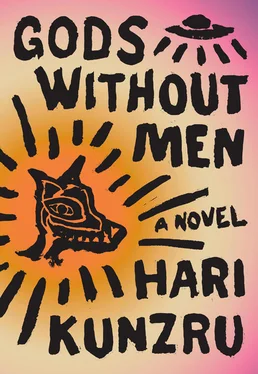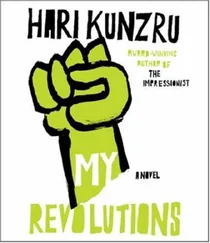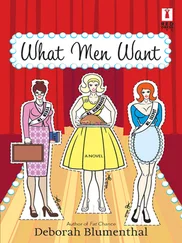She wasn’t sure why she didn’t want to let him know where she was going; he wouldn’t have stopped her. She could tell it crossed his mind that she was going to see a lover, but neither of them had enough energy to sleep with each other, let alone anyone else, and he knew it. He’d hovered in the bedroom doorway as she packed, a stricken look on his face. Stop watching me, she snapped. You’re coming back, he asked. Of course I am, she stuttered. Don’t be ridiculous.
The conference was in Boston. On the train up, she stared out of the window and fretted. There was a thunderstorm and she took a taxi to the convention center, which was jammed with people wearing stickers saying HI MY NAME IS, dripping water onto the carpet tiles. She walked down aisles lined by little stalls, each manned by someone, usually a parent, passionately promoting magnesium injections, antifungal creams, biofeedback, craniosacral massage, hyperbaric oxygen, Chinese herbs, antibiotics, vitamin B 12.… There were blood tests, eye tests, tests on saliva and hair and urine and brain waves. Some of these treatments were plainly ludicrous, and she found it hard to make eye contact with their proponents, scared she’d find her own need reflected back in strangers’ faces. She collected leaflets and tried not to feel the energy that filled the hall, the shared yearning for a magic bullet, a royal touch to ward off evil.
That evening she attended a seminar where a doctor with a headset and the breezy manner of a late-night television host claimed that autism was caused by thimerosal, the mercury-based preservative in vaccines. The answer, apparently, was something called chelation therapy, drugs that would cleanse the heavy metals out of a child’s blood. The doctor’s own son had been autistic. After chelation, the boy had smiled. The doctor knew the other parents in the audience would understand how this had felt for him personally. For the first time his kid had smiled and looked his daddy in the eye! The doctor spread his arms wide. He looked elated, transfigured. Lisa bought a copy of his self-published book. On the train home the next day, she gave in to her excitement. Could this be the root of Raj’s problem? She and Jaz had dutifully followed the vaccination schedule imposed by their physician — hepatitis, polio, meningitis, diphtheria, MMR.… What if they’d poisoned their baby? What if they’d hurt him through their very eagerness to keep him safe?
When she told Jaz where she’d actually been, she burst into tears. He asked why she hadn’t told him before and she sobbed on his shoulder, trying to describe the horrible neediness of the other parents. She knew instinctively from the limpness of his arm round her, the tightness in his voice, that something had changed between them. By going up to Boston she’d taken the initiative. From now on it would be up to her to decide what they’d do for Raj. The next day she took a urine sample and sent it off to a lab with a check for three hundred dollars. Two weeks later she received a letter confirming that Raj’s mercury levels were slightly elevated. By that time Jaz had been doing some reading of his own, and objected that the link between mercury and autism wasn’t proven. It was, he said in one of his infuriating scientist phrases, “highly contentious.” This led to a vicious fight. Had he given up? Was he really too weak to fight for his son? He seemed to have no answer, and she triumphantly entered his credit-card number into a website to buy a course of chelating drugs, which arrived in a UPS box a few days later.
Raj hated the treatment. It smelled foul and made his pee sulfurous. But she persisted, forcing it down his throat, even when he struggled, and Jaz claimed she was being too violent. And it seemed to make a difference. Raj was calmer. His concentration was better. She phoned girlfriends to exult. Yes, that’s right. He played with his blocks for fifteen minutes without getting distracted. We were in the park and he held my hand.
Jaz was compliant, but she began to resent his lack of enthusiasm for the struggle. One evening she confronted him and forced him to admit that he didn’t see much change in Raj’s behavior. Are you blind, she asked. Are you actually blind? He shrugged and held up his hands defensively. The pathetic little gesture made her so angry that she threw a lamp at him. It arced across the bedroom, smashing against the wall. His face took on a strange look, a mixture of fear and pity she’d never seen before. In a gentle voice he told her he thought she was taking on too much. She needed a rest. That was when she attacked him properly, kicking his shins, beating her fists against his head and chest until he gripped her wrists and forced her down onto the bed. They were both in tears. She could hear herself yelling how dare you, how dare you. How dare you tell me I’m taking on too much when you won’t even try?
It became a battle of hope against measurement. Jaz thought she was being irrational, and rationality was everything to him, his way of trying to limit the chaos that had overtaken their life. She got that. She wasn’t stupid. But really? Measurable improvement. Objective criteria . Such tone-deaf, boneheaded phrases. When he talked like that, she wanted to tear down his pomposity like old ivy off a wall. There was something so smug and unimaginative, so stupid , about his assurance that there was no alternative to the medical establishment’s current theories. After all, how many times had they been wrong? Once upon a time, people had swallowed radium as a cure-all and thought women’s wombs were damaged by train travel. Glumly, Jaz accepted all this was true, and even began to help when it was time to get Raj to take his meds, but it was not enough to win him more than a truce. She could tell he was getting involved not because he believed in the treatment, but because he wanted her to realize for herself it was wrong. Somehow this made things worse. It was as if he didn’t want Raj to get better. The drugs were having an effect. She was clear on that. Then, as a month became two, then three, she felt less sure. The early signs of progress hadn’t continued. Finally she admitted to herself that Raj was as withdrawn as ever. In some obscure way she blamed Jaz. He’d contaminated the treatment. If he’d believed, really believed, maybe it would have worked. She knew she sounded like Peter Pan, but she didn’t give a damn.
One night Jaz came home to find her emptying the kitchen cabinets, throwing cans and packets into the trash. GFCF. Gluten-free, casein-free. Jaz asked if she really thought autism was caused by not eating organic. She told him to stop patronizing her. If Raj had allergies, a change in diet would at least alleviate some of his gastric symptoms. Jaz sat down at the breakfast bar and held his head in his hands. “Are you really going to put us all through this?” he asked. Never had she despised him so much. Was she really married to a coward, a man so spineless he wouldn’t even fight for his own son?
So the family embarked on a wheat- and dairy-free diet. Already, seafood was banned on the grounds of mercury contamination. Jaz absolutely refused to countenance vegetarianism, claiming that without meat, he’d feel he’d lost his culture altogether. Lisa scoffed. Did he really feel so threatened? They’d already put off the decision to circumcise Raj because of his “cultural sensitivities.” She put sneering air-quotes round the phrase. He began to find excuses to eat out, with clients or people from the bank.
She started researching other remedies. Could injections of an intestinal hormone help Raj with his bowel problems? What about sessions in an oxygen chamber? Increasingly, the particular treatments were less important to her than a stance, a hopeful habit of mind. She read books about self-healing, positive visualization. Former colleagues would sneak proofs to her from the publisher where she used to work, which had an imprint dedicated to New Age thought.
Читать дальше












